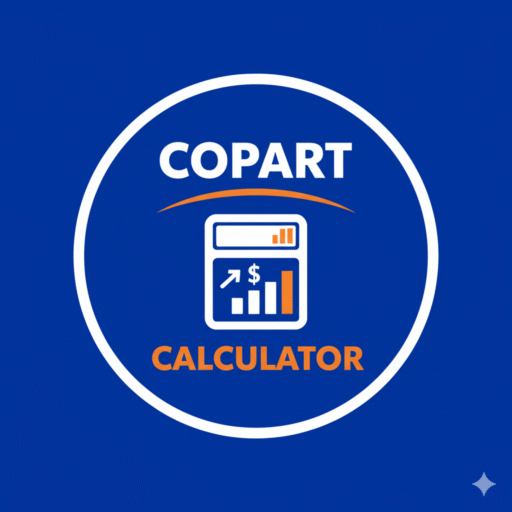If you’re planning to buy a vehicle from Copart in 2025, it’s crucial to understand every fee involved. Going beyond just your winning bid, Copart’s fee structure includes several charges that can affect your total cost—buyer’s premium, gate and environmental fees, virtual bid fees, payment processing, state sales tax, broker fees, and storage charges.
This guide walks you through each fee, provides practical examples, and gives you tools to estimate your real out-the-door price before you bid.
What Are Copart Fees in 2025?
When you win an auction at Copart, you’re responsible for more than just your bid amount. Here’s a breakdown of the most common Copart fees for 2025:
- Buyer’s Premium: Copart’s commission, calculated as a percentage of your winning bid. This fee increases with higher bids and may have a cap for larger purchases.
- Gate Fee: A fixed, per-vehicle charge covering yard handling and processing.
- Environmental Fee: A small, flat charge related to facility and regulatory requirements.
- Virtual Bid Fee: An extra charge that applies if you participate in certain types of bidding, such as live virtual auctions.
- Payment Processing Fee: Depends on whether you use a secured or unsecured payment method.
- Sales Tax: Based on your registration state and the vehicle type.
- Storage Fees: Charged if you don’t pick up your vehicle within the allowed grace period.
- Broker Fee: If you don’t have the required license for some vehicles or states, you’ll need a broker to bid for you—usually for a flat or percentage-based fee.
To avoid surprises, always use a Copart Fee Calculator before bidding. Review the detailed guide on Copart buyer fees to understand what’s changing in 2025.
How to Calculate Your Total Cost
Follow these steps for a reliable estimate:
- Estimate your likely winning bid for the vehicle you want.
- Use our auction fee tool and enter details like buyer type, payment method, and bid type.
- Calculate your state’s sales tax using our tax estimator.
- Check your pickup plan—if there’s any chance of delay, use our storage calculator to add storage costs.
- Include broker fees if needed for non-licensed buyers.
If you want to make sure you never go over budget, our bid calculator will help you reverse-calculate your maximum safe bid.
Copart Fee Examples (2025)
Here’s how Copart fees might add up in different scenarios. (Always check the latest rates using our calculators.)
Example 1: Budget Car, Licensed Buyer, Secured Payment
- Winning Bid: $2,000
- Buyer’s Premium: $240 (12%)
- Gate + Environmental: $120
- Virtual Bid Fee: $0 (pre-bid)
- Payment Processing: $0 (secured)
- Sales Tax: $127 (6%)
- Total Fees: $360
- Out-the-Door: ~$2,487
Example 2: SUV, Unlicensed Buyer, Broker Involved
- Winning Bid: $6,000
- Buyer’s Premium: $720
- Gate + Environmental: $120
- Virtual Bid Fee: $50 (live virtual)
- Payment Processing: $60 (1% unsecured)
- Broker Fee: $400
- Sales Tax: $370 (6%)
- Total Fees: $1,350
- Out-the-Door: ~$7,720
Example 3: Pickup, Delayed Pickup with Storage
- Winning Bid: $5,000
- All Auction Fees: ~$1,120
- Storage Fees: $125 (5 days at $25/day)
- Sales Tax: $307 (6%)
- Out-the-Door: ~$6,552
Check out the Copart fees chart for a quick comparison of the new fee structure.
How Copart Fees Impact Your Maximum Bid
To avoid overpaying, always work backward from your budget:
Maximum Bid = Your Budget – (Estimated Fees + Sales Tax + Expected Storage + Broker Fee)
Let our bid calculator do the math for you—factoring in every Copart fee.
How to Reduce Your Copart Fees
- Choose the right payment method: Secured payments may avoid extra processing fees.
- Arrange transport before bidding: Prevent costly storage by planning your pickup in advance.
- Compare licensed vs broker paths: Frequent buyers may save by getting licensed, while brokers can be more practical for occasional purchases.
- Decide your bidding strategy early: Pre-bid versus live or virtual bidding can affect which fees apply.
- Check similar lots: Sometimes, title status or location can change your total cost.
After you win a vehicle, refer to Copart fees after winning a bid to see what extra charges may apply. If you’re a licensed or nonlicensed buyer, read the updated Licensed vs Nonlicensed Buyer Fees to see which tier applies to you.
Frequently Asked Questions (2025)
What is the biggest Copart fee?
Usually, the buyer’s premium is the largest, followed by gate and environmental fees. Taxes and broker fees can also be significant in some cases.
Do Copart fees differ by state?
The core auction fees are set by Copart, but sales tax depends on your registration state. Use our tax estimator for the most accurate rate.
When do storage fees begin?
Storage fees start after the grace period ends. Check the policy for your chosen Copart location and use our storage calculator to estimate costs for delays.
Is a broker always more expensive?
Not necessarily. For small purchases, a flat broker fee can be a bigger percentage of your total. For large or rare purchases, using a broker can sometimes be the best option.
How do I get a true out-the-door price?
Use our auction fee tool, add your state’s tax, and factor in storage if needed. If you want to set a maximum safe bid, try the bid calculator.
Final Tips Before You Bid
- Always run a live estimate using the latest fee schedules.
- Save the breakdown for your records and keep a buffer for unexpected costs.
- Review Copart’s official terms and use our calculators to translate them into real-world totals.

Martinez is the creator of CopartCalculator.com, a trusted resource for estimating fees and costs when buying vehicles from Copart auctions. With a focus on accuracy and ease of use, Martinez develops tools and content that help users make informed decisions and avoid hidden surprises. His mission is to simplify complex calculations and save buyers time and money throughout the auction process.
